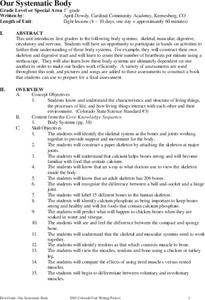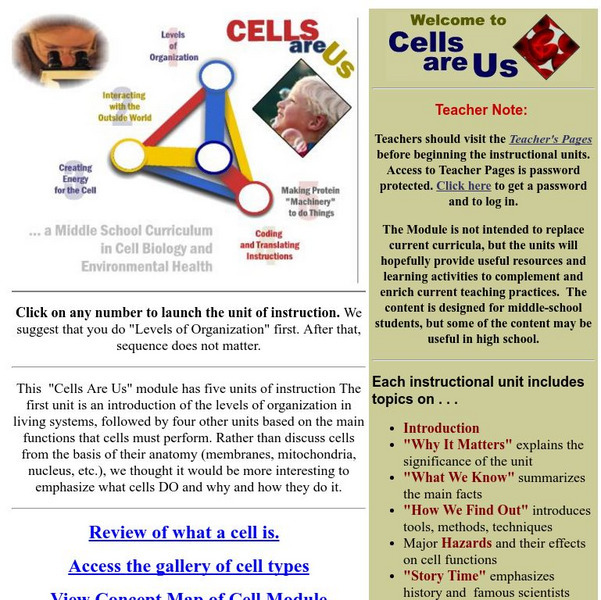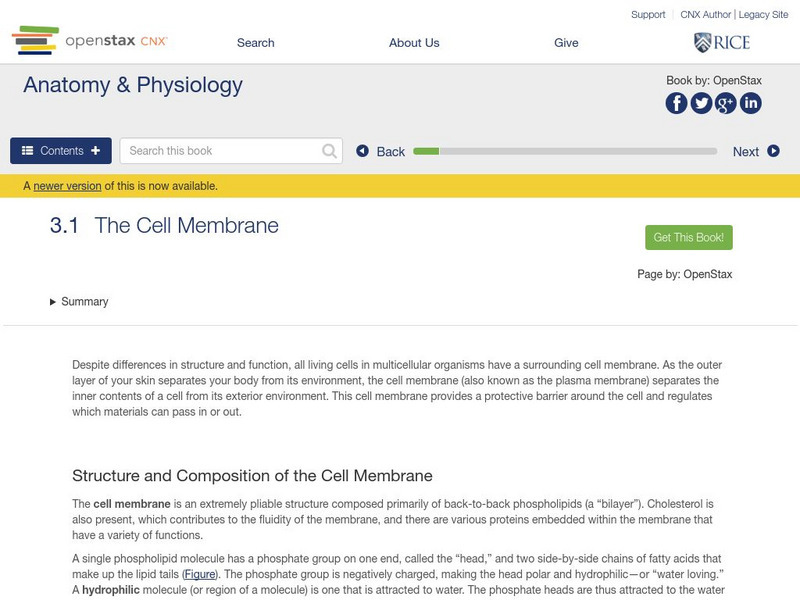MENSA Education & Research Foundation
The Cell: the Building Blocks of Life
Do you have early finishers asking what they can do next, or any budding scientists eager to learn more about plant and animal cells? Then here is a cell unit for you! The packet provides scholars with everything they need in order...
BBSRC
Discovering DNA: The Recipe for Life
A pinch of adenine, a dash of thymine and ta-da, you have life! Well, it's not quite that simple, but through this series of activities and experiments young scientists learn about the structure of DNA and how it contains the recipe...
Curated OER
The Brain’s Inner Workings
Do you want to learn about how you learn? Help pupils become the best learners they can be by teaching them how their brain works. The resources available include videos about brain structure and a study guide full of activities that...
Kenan Fellows
Unit 3: Genetic Variation
What happens when genes change? Junior genetic investigators examine the effects of mutation in the third unit of a four-part Biotechnology series. Individuals discover the types of mutations through a series of PowerPoints, then partner...
Curated OER
Genome: The Secret of How Life Works
What do you have in common with a fruit fly? About 60 percent of your DNA. The resource, divided into two units, is intended for grades four to eight and another for high schoolers. Both units include eight lessons covering the...
Columbus City Schools
Photosynthesis and Respiration
Thirty percent of the world's oxygen is produced by rainforests found throughout the world. Seventh grade learners explore the processes of photosynthesis and respiration through 10 days of labs, manipulatives, and discussions. They...
Curated OER
Our Systematic Body
Students explore several parts of the body system in the eight lessons of this unit. Through several hands-on activities, the skeletal, muscular, digestive, circulatory and nervous systems are observed.
Kenan Fellows
Unit 4: The Brain
Drugs interact with the brain to alter moods, emotions, and behaviors by changing the brain's chemistry, perceptions, and interactions. The final lesson in the Pharmacology unit shows scholars experiments, has them complete four labs,...
Curated OER
When Germs Attack!
Students explore the hidden world of microbes and how our bodies spring into action in response to diseases. This ten lesson unit presents data on several microbial diseases and the reaction of the body's immune system.
Department of Defense
Do Dea: Biology: Unit 3: Cell Structure
In this third unit of a Biology course, students learn about cells and cell structure. They compare prokaryotic and eukaryotic cells and learn about the specialized structures in a cell and what their functions are. They will also learn...
CK-12 Foundation
Ck 12: Cell Biology
[Free Registration/Login may be required to access all resource tools.] Cells make up all living things but not all cells look alike. This activity introduces cells, cell theory, and the levels of organization in organisms.
CK-12 Foundation
Ck 12: Cell Biology
[Free Registration/Login may be required to access all resource tools.] Read grade-level texts, complete activities, and take assessments about cell biology.
National Cancer Institute at the National Institutes of Health
Seer Training Modules: Cells, Tissues, and Membranes
Self-guided learning activity where students learn about cell structure and function, different types of tissues, and various kinds of membranes in the body. There is a short quiz at the end of the lesson to check for understanding.
Vision Learning
Visionlearning: Cell Biology: Passive and Active Transporters
Explanation of cell membranes and the way selective materials may move through them.
Georgia Department of Education
Ga Virtual Learning: Anatomy and Physiology: Cells
In this module, students discover how each cell is organized to complete the function of producing and transporting proteins, and how cells relate to homeostasis of the body.
University of Washington
Genome Sciences Education Outreach: Amazing Cells [Pdf]
Multi-activity learning module in which students engage in learning about plant and animal cells through the use of microscopes.
Texas A&M University
Peer Curricula: Cells Are Us
Find five instructional units on cells: levels of organization, interacting with the outside world, creating energy for the cell, coding and translating instructions, and making protein "machinery" to do things. Each unit is broken down...
OpenStax
Open Stax: The Cell Membrane
Learn here about the structure and function of the cell membrane.
Utah State Office of Education
Utah Science: Introducing Cells!
Get to know cells, what they create, how to identify them, and how to tell whether they belong to a plant or an animal. Several activities
University of Arizona
The Biology Project: Cell Membrane Tutorial
Great overview of cell membranes. The site presents the information as a tutorial with multiple choice questions to guide the learner. Very well designed site on cell membranes.
CK-12 Foundation
Ck 12: Organization of the Human Body
[Free Registration/Login may be required to access all resource tools.] A variety of learning opportunuties about levels of organization in the human body. Includes videos, activities, discussion questions, and quizzes.
Sophia Learning
Sophia: Endocytosis and Exocytosis: Lesson 1
This lesson introduces the processes of endocytosis and exocytosis, both processes which move larger molecules in and out of the cell, by way of vacuoles. It is 1 of 4 in the series titled "Endocytosis and Exocytosis."
National Cancer Institute at the National Institutes of Health
Seer Training Modules: Introduction to the Nervous System
Self-guided learning activity where students learn about the structure and function of the human nervous system. There is a short quiz at the end of the lesson to check for understanding.
National Cancer Institute at the National Institutes of Health
Seer Training Modules: Introduction to the Lymphatic System
Self-guided learning activity where students learn about the structure and function of the human lymphatic system. There is a short quiz at the end of the lesson to check for understanding.




















